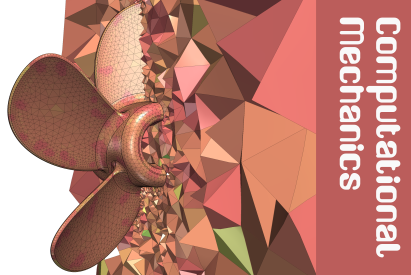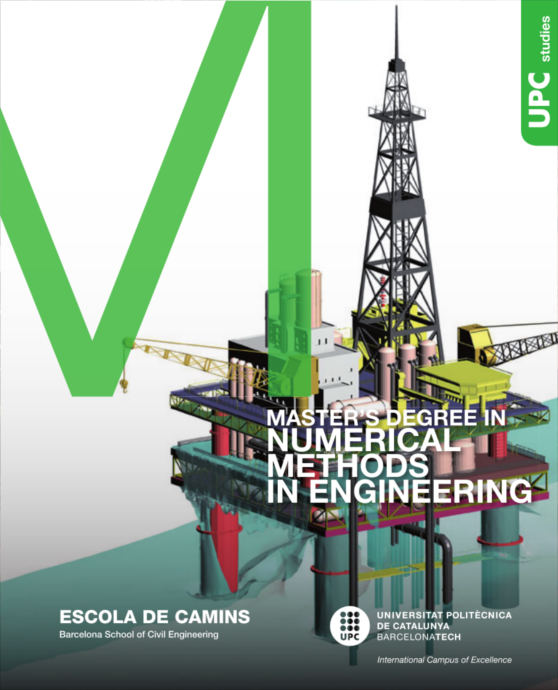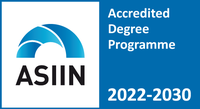Numerical Methods in Engineering
 Nowadays, the industrial sector requires precise and reliable numerical simulations of product and process design: the Master's Degree in Numerical Methods in Engineering meets the needs of simulating, forecasting and optimising any problem in the field of engineering through computational mechanics. Given the transversality and universality of this discipline, and in order to facilitate the internationalisation of its graduates, these studies are taught in English.
Nowadays, the industrial sector requires precise and reliable numerical simulations of product and process design: the Master's Degree in Numerical Methods in Engineering meets the needs of simulating, forecasting and optimising any problem in the field of engineering through computational mechanics. Given the transversality and universality of this discipline, and in order to facilitate the internationalisation of its graduates, these studies are taught in English.The Master's Degree in Numerical Methods in Engineering provides multidisciplinary training in computational mechanics in view of the growing demand for accurate and reliable numerical simulations. It aims to produce specialists in the theory and applications of calculation methods for product and process design, in the widest possible sense. Graduates will immediately be able to apply the knowledge acquired in industry. Their solid scientific training will also enable them to pursue a doctoral degree.
Choose the International Program in Computational Mecanics and get a Double Degree at UPC-BarcelonaTECH and the Universities of Swansea, Stuttgart or Padova.
| Academic year starts in | Fall semester (Q1): September Spring semester (Q2): February |
| Duration | 2 years |
| Study load | 120 ECTS (including the Master's Final Thesis) |
| Minimum academic progress | The minimum academic progress for first year students is 15 ECTS. |
| Delivery | On-campus |
| Enrolment |
|
| Language | English |
| Places | 25 |
| Official degree | Master's Degree in Numerical Methods in Engineering by Universitat Politècnica de Catalunya (recorded in the Spanish Ministry of Education's degree register) |
| Double degrees |
|
| Fees |
More information about fees and payment options |
| Academic coordinator | Michele Chiumenti |
This master has a program in Computational Mechanics that implies double degrees with the universities of Stuttgart, Swansea or Padova. This program is designed for students who wish to excel in the field of computational mechanics. It will provide students with the best training for their future professional career, as well as prepare them for research with the best prior knowledge to do a PhD in the most important centers around the world..
Itineraries in Computational Mechanics
There are 6 options to choose first-year institution and second-year institution:
- Universitat Politècnica de Catalunya (Barcelona, Spain) - Swansea University (Swansea, UK)
- Swansea University (Swansea, UK) - Universitat Politècnica de Catalunya (Barcelona, Spain)
- Universitat Politècnica de Catalunya (Barcelona, Spain) - Stuttgart University (Stuttgart, Germany)
- Stuttgart University (Stuttgart, Germany) - Universitat Politècnica de Catalunya (Barcelona, Spain)
- Universitat Politècnica de Calalunya (Barcelona, Spain) - Università di Padova (Padova, Italy)
- Università di Padova (Padova, Italy) - Universitat Politècnica de Catalunya (Barcelona, Spain)
You must select one of these combinations according to your preferences for your first and second year. Please note that successful applicants will not be guaranteed their choices, but we will endeavour to place students at their preferred choices. The students scoring the highest marks in the application process will be given priority in the allocations.
Access & admission to the Computational Mechanics program
Starting at UPC on your 1st academic year (options 1, 3, 5)
Fill this form out to apply for the program, should you choose to start your master's degree (1st year) at UPC.
Please download here the list of documents that you must upload with your application.
Pre-registration period: February 21st to July 1st. Applications submitted after the deadline will not be accepted.
Specific admission requirements
In order to gain admission to the Master's Degree in Numerical Methods in Engineering applicants must have studied one of the following studies:
- Bachelor's Degree (5-year degree) in Engineering in the following fields: mechanical, electrical, materials, civil, aeronautical, systems, mining, naval, telecommunications, physics, forest or agricultural
- Bachelor's Degree (5-year degree) in Mathematical, Physical, Chemical, Biological or Geological Sciences
- Diploma (3-year degree) in Engineering in the following fields: mechanical, electrical, materials, civil, aeronautical, systems, mining, naval, telecommunications, physics, forest or agricultural
- Diploma (3-year degree) in Mathematical, Physical, Chemical, Biological or Geological Sciences
- Other studies:
If the diploma or degree is different from the ones listed above, the Academic Committee in charge of the master's degree will assess the applicant's curriculum in order to grant them access and establish the necessary bridging courses.
Students pending obtaining the degree that gives access to the master's degree
UPC undergraduate students who, despite not having obtained the bachelor’s degree, have pending the TFG and, at most, up to 9 ECTS (including credits pending recognition or transfer) or who have completed their studies, but are waiting to achieve, if possible, transversal competence in a third language. Under no circumstances will students who access this route be able to obtain a master's degree if they have not previously obtained a bachelor's degree.
Candidates from other universities who are enrolled in all the credits to complete the studies that give access to the master's degree can apply for access. Acceptance will be conditioned to the fulfillment of the general and specific access and admission requirements at the time of formalizing the registration.
You will find all the information about the general Access requirements to UPC master's programs here.
Admission criteria
The following factors or parameters are considered for admission to the Master's Degree in Numerical Methods in Engineering:
- Academic record (F1 = 70%)
Weighting as established by the Academic regulations for Master's Programs at UPC-BarcelonaTech. - CV assessment (F2 = 10%)
- Motivation letter (F3 = 10%)
- Two recommendation letters (F4 = 10%). The letters must be signed by qualified professors/researchers or company-employed engineers.
Students interested in enrolling in this master's degree must certify their B2.2 proficiency level in English. The Consell Interunivesitari de Catalunya establishes the official certificates for meeting the B2 requirement on gaining admission to all UPC master's degrees.
You can check the results of the evaluation and selection of the applications for the current academic year here.
Pre-enrolment and enrolment
Check here the general admission requirements for UPC masters and information on pre-enrolment: calendar, how to apply for admission, how to reserve a place if the resolution is favourable, etc.
Objectives
The Master's Degree in Numerical Methods in Engineering provides a multidisciplinary and in-depth training in the most popular calculation methods —called numerical—, such as finite elements and other similar numerical techniques. With a theoretical and applied teaching, the aim is to train specialists with the ability to immediately incorporate the acquired knowledge into the industry and with sufficient basic training to successfully face a doctoral degree.
Career opportunities
The course addresses real educational needs in Europe and worldwide. Computational mechanics is set to become even more multidisciplinary than in the past, and it is expected that in the coming decade the demand for accurate and reliable numerical simulation of engineering systems will undergo explosive growth and have a major impact on our everyday lives. Graduates of this master's degree will be experts in numerical methods in engineering. They will be professionals able to put into practice the acquired knowledge directly to industry and they will also have the necessary scientific background to undertake a doctoral degree successfully.
Basic competencies
- CB6 Possessing and understanding knowledge that provides the basis or opportunity to be original in the development and/or application of ideas, often in a research context.
- CB7 For students to know how to apply the knowledge acquired and their ability to solve problems in new or unfamiliar environments within broader (or multidisciplinary) contexts related to their area of study.
- CB8 For students to be able to integrate knowledge and face the complexity of formulating judgments based on information that, being incomplete or limited, includes reflections on social and ethical responsibilities linked to the application of their knowledge and judgments.
- CB9 For students to know how to communicate their conclusions (and the knowledge and ultimate reasons that support them) to specialized and non-specialized audiences in a clear and unambiguous way.
- CB10 For students to possess the learning skills that allow them to continue studying in a way that will be largely self-directed or autonomous.
General competencies
- CG1 Knowledge of numerical methods and solution mechanisms. Complete and consolidate the basic student training in solving problems using numerical and computational methods, reinforcing their knowledge of the basics, as well as of the specific applications.
- CG2 Knowledge of the theories and applications of numerical methods. Ability to acquire advanced knowledge and understanding of the theories and applications of numerical methods in solving engineering problems.
- CG3 Experience in solving problems using numerical methods. Ability to acquire experience and criteria in the application of numerical methods through the use of calculation programs, pre and post graphic processors, programming languages and scientific calculation libraries.
- CG4 Consolidation of the application criteria of numerical methods. Complete and consolidate the knowledge, criteria and critical spirit to propose conventional solutions and as well as to analyze the results in characteristic numerical modeling problems.
- CG5 Knowledge of social networks in the field of numerical methods. Knowing and acquiring a critical awareness about the avant-garde of the Spanish, European and international community of numerical methods in engineering.
- CG6 Numerical modeling of real problems. In depth ability to solve real engineering problems through numerical modeling by identifying the underlying mathematical model, the most appropriate calculation method and the critical interpretation of the results.
- CG7 Independence to question. Acquire the ability to autonomously use their knowledge and understanding of computational engineering to design solutions to new or unfamiliar problems, incorporating theoretical and practical knowledge and know-how, if necessary, from other disciplines of engineering and basic sciences, and designing new original resolution methods appropriate to the set of final objectives.
- CG8 Knowledge of the scope of numerical methods. Understand the applicability and limitations of numerical modeling and existing calculation technologies.
- CG9 Independence to research. Acquire experience and autonomy in the search, analysis, compilation and synthesis of cutting-edge scientific and technical information.
Cross-disciplinary competencies
- CT1 CAPACITY FOR ENTREPRENEURSHIP & INNOVATION. Knowing and understanding the mechanisms on which scientific research is based, as well as the mechanisms and instruments for transferring results between the different socio-economic agents involved in R+D+I processes, acquiring thus the ability to lead a work team made up of various professional profiles and disciplines.
- CT2 SUSTAINABILITY & SOCIAL COMMITMENT. Being able to integrate knowledge and face the complexity of formulating judgments based on information that, being incomplete or limited, includes reflections on the social and ethical responsibilities linked to the application of their knowledge and choices.
- CT3 THIRD LANGUAGE. Having English as a third language, at an appropriate level in oral and written form, so as to being able to work and communicate effectively in international and intercultural environments.
- CT4 EFFECTIVE ORAL AND WRITTEN COMMUNICATION. Improving communication skills: oral presentations, preparation of professional and scientific reports in a clear and concise way to communicate their conclusions, the knowledge and ultimate reasons that support it, to specialized and non-specialized audiences in a clear and unambiguous way.
- CT5 TEAM WORK. Being able to work as a member of an interdisciplinary team, not only as a member, but also to perform management tasks in order to contribute to developing projects with pragmatism and a sense of responsibility, assuming commitments considering the resources and time available. Obtaining a good knowledge of the community of numerical methods in engineering at a national and international level.
- CT6 SOLVENT USE OF INFORMATION RESOURCES. Managing the acquisition, structuring, analysis and visualization of data and bibliographic and computer information of a scientific and technical nature and critically assess the results of this management.
- CT7 SELF-EMPLOYED LEARNING. Detecting gaps in one's own knowledge and overcome them through critical reflection and the choice of the best action to expand this knowledge and motivate oneself to continue training throughout their professional life.
Specific competencies
- CE1 Knowledge of practical numerical modeling. Ability to acquire knowledge in advanced numerical modeling applied to different areas of engineering such as: Civil and environmental engineering, Mechanical and aerospace engineering, Nano-engineering and bioengineering, Naval and marine engineering, etc.
- CE2 Knowledge of the state of the art in numerical algorithms. Ability to catch up on the latest numerical technologies to solve engineering and applied science problems.
- CE3 Knowledge of modeling materials. Ability to acquire knowledge related to modern physical models in material science (advanced constitutive models) in solid and fluid mechanics.
- CE4 Knowledge of validation and verification criteria. Management capacity of numerical simulation quality control techniques (validation and verification).
- CE5 Experience in numerical simulations. Acquisition of fluency in modern numerical simulation tools and their application to multidisciplinary engineering and applied science problems.
- CE6 Interpretation of numerical models. Understanding the applicability and limitations of different computer calculation techniques.
- CE7 Experience in programming calculation methods. Ability to acquire training in the development and use of existing calculation programs, as well as pre and post processors, knowledge of programming languages and standard calculation libraries.
COURSES |
ECTS |
| First year | |
| Fall semester | |
| 250950 Numerical methods for PDEs | 5 |
| 250951 Finite element | 5 |
| 250952 Continuum mechanics | 5 |
| 250954 Advanced fluid mechanics | 5 |
| 250960 Communication skills 1 | 5 |
| 250961 Computational mechanics tools | 5 |
| Spring semester | |
| 250956 Computational solid mechanics | 5 |
| 250958 Computational structural mechanics & dynamics | 5 |
| 250957 Finite elements in fluids | 5 |
| 250963 Coupled problems | 5 |
| 250970 Domain descomposition & large scale scientific computing | 5 |
| 250955 Programming for engineers & scientists | 5 |
| Second year | |
| Fall semester | |
| Compulsory Elective | |
| 250964 Entrepreneurship | 5 |
| 250965 Advanced discretization method | 5 |
| 250967 Communication skills 2 | 5 |
| Elective | |
| 250971 Reduced order modelling | 5 |
| Spring semester | |
| Elective | |
| 250439 Numerical models in civil and structural engineering | 5 |
| 250443 Machine learning and models for decision making | 5 |
| Fall &/or spring semesters | |
| Mandatory | |
| 250968 Master's Thesis | 30 |
| Elective | |
| 250972 External internship | 15 |
Students enrolled at UPC for the Master's Degree in Numerical Methods in Engineering can access the following information:
Choose the subjects you want to study and simulate how your schedule will be with the UPC Timetable Viewer:
Wednesdays from 12:00 to 14:00 there are no classes and these periods can be used for cultural activities (culture period).
The Master's Thesis is an original exercise to be done individually and presented and defended before a university panel consisting in a project in the sphere of the specific civil engineering technologies synthesising and integrating the competences acquired on the course.
Related links
Double degrees
Institutional information
Contact
- Secretariat:
Lelia Zielonka - Admission: admissions.masters.camins@upc.edu
- Information enrolled students: masters.camins@upc.edu





Share: